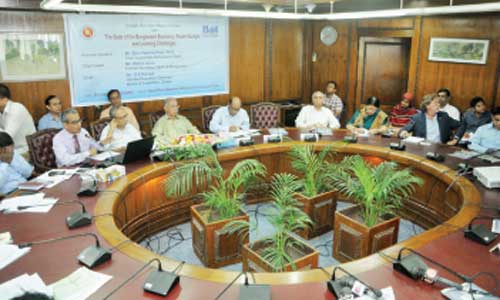Brexit impact will not last long: BoI seminar
Though the British exit from the European Union may put a short-term impact, there is no possibility of a long-term impact of the event on the Bangladesh economy, experts said at a discussion on Wednesday.
They made the observation at a discussion on ‘State of Economy’ organised by the Board of Investment in the capital.
BoI executive chairman SA Samad chaired the discussion while former secretary Waliul Islam attended as chief guest and Bangladesh Bank chief economist Biru Paksha Paul presented the keynote paper.
‘The UK’s decision to leave EU may create some short-term challenges, but it will not impact [Bangladesh economy] significantly,’ Biru Paksha said.
Of the Bangladesh’s export transactions, 82 per cent transactions are conducted in the US dollar and the rest 18 per cent in the pound including 4 per cent in the Great Britain Pound, the BB chief economist said.
‘If any short of economic stagnancy is created in the United Kingdom due to its exit from the European bloc, the demand for Bangladeshi apparel products will not decline in the UK as Bangladesh exports only basic products. We had seen during the global recession in 2007-2008 that Bangladesh posted record growth in export,’ he said.
Referring to the $30 billion foreign exchange reserves in Bangladesh, Biru Paksha said that the reserve emerged bulky.
‘Foreign currency reserve to meet import expenditure of three months is enough, but we have reserve to meet import expenditure for nine months. The fund has to be brought to the productive sectors,’ he said.
He said despite a 1.20-per cent population growth Bangladesh’s per capita income has increased to $1,466 with a 5.50-per cent growth which indicates economic soundness.
He also stressed the importance of elevating investment to 32 per cent of gross domestic product from the existing 29 per cent.
Stressing the importance of creating employment generation Waliul said economy cannot sustain without generation of employment.
Considering the fact, increasing government investment is vital especially in health and education sectors, he said.
The former secretary also said that the capital market was yet to be utilised for industrialisation.
‘Investors have become hopeless following the 2010 capital market crash, institutional investors are not that active and companies with good fundamentals are not coming to the market,’ he said.
Samad said with the contribution of the private sector country’s economy is going forward.
‘Although the development is yet to be visible from outside, different invisible developments are taking place,’ the BoI executive chairman said.
On the budget for the fiscal year 2016-17, Samad said the proposed budget is implementable as it is only 17 per cent of Bangladesh’s GDP whereas the figure is 80 per cent in the UK and 60 per cent in Scandinavian countries.
News Courtesy: www.newagebd.net











